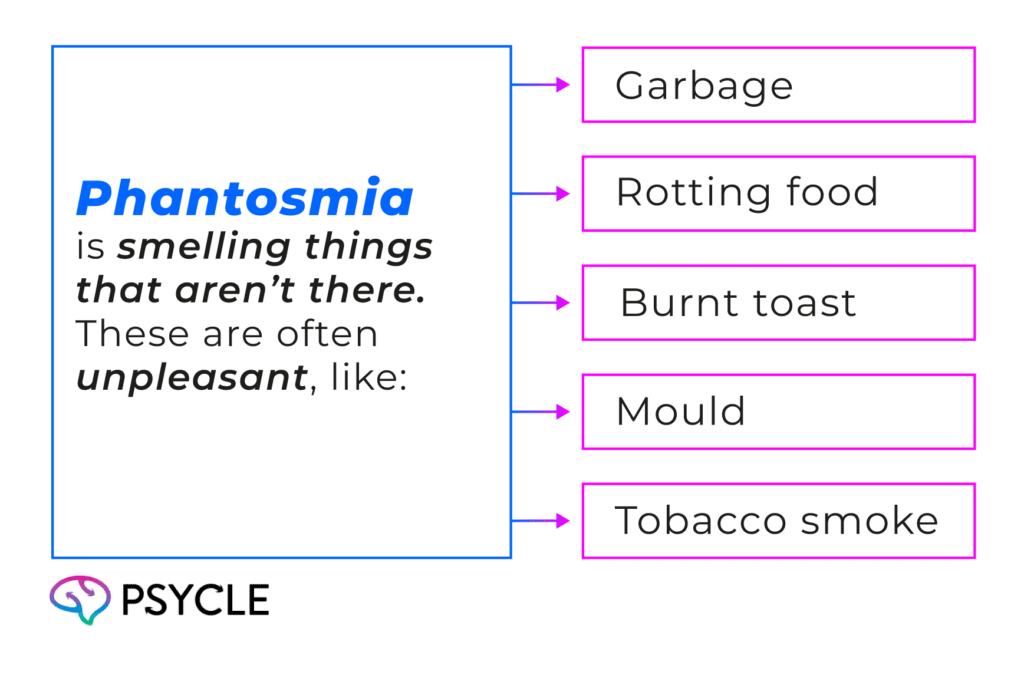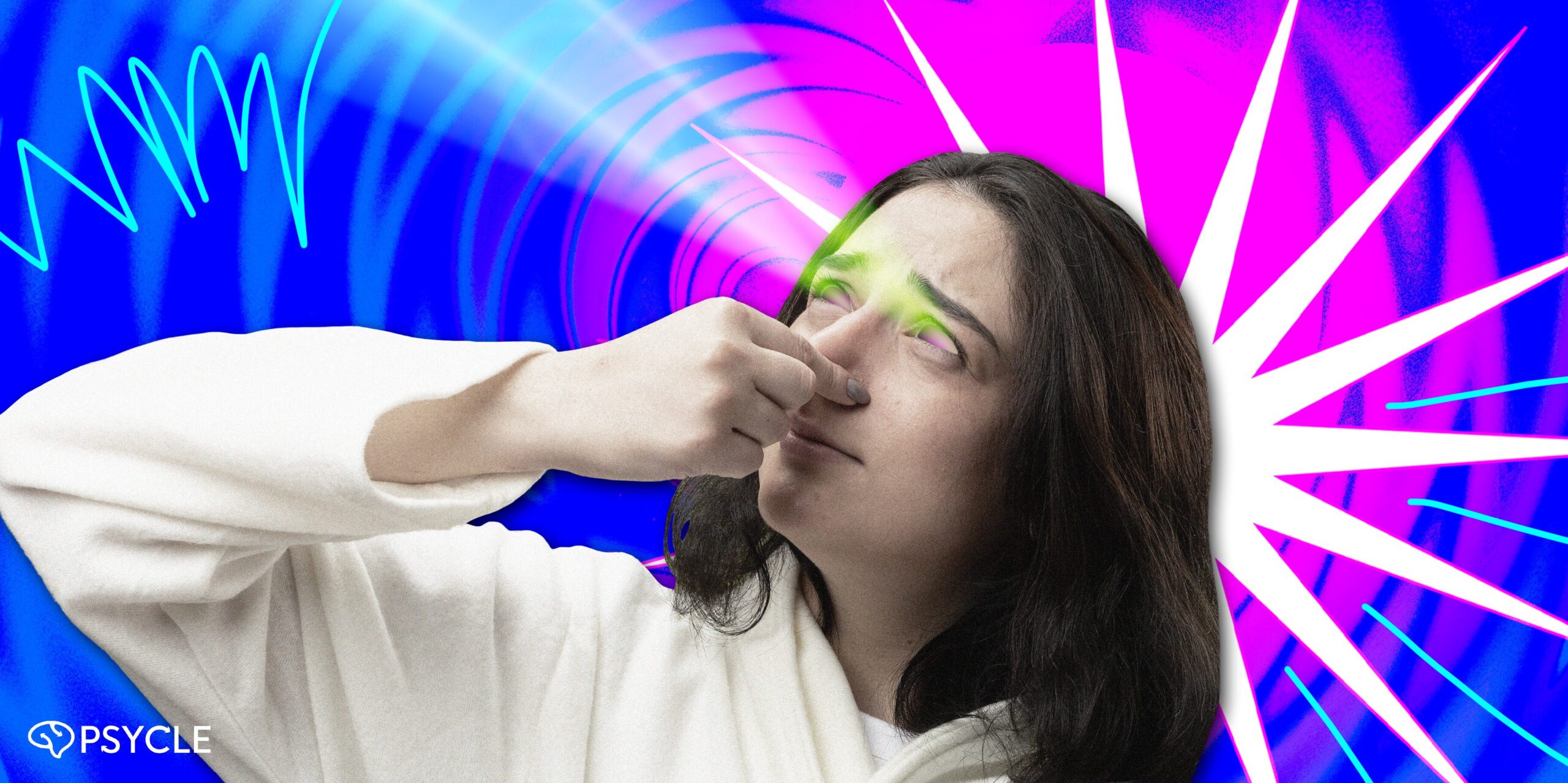Can schizophrenia be smelled? While schizophrenia is typically defined by its psychological symptoms, anecdotal reports suggest individuals with the disorder may have a distinctive body odour.
In this article, we’ll explore the scientific evidence behind these claims and the potential biology involved. We’ll also discuss how individuals with schizophrenia perceive smells differently.
Key Takeaways
- Some reports suggest individuals with schizophrenia may have a distinctive, often unpleasant body odor.
- Tranns-3-Methyl-2-Hexenoic Acid (TMHA) is a chemical compound found in sweat that may contribute to this smell.
- Fear-induced pheromones and poor hygiene could also play roles in altering body odor.
- People with schizophrenia often experience olfactory hallucinations, smelling things that aren’t there.
- Schizophrenia is also linked to olfactory dysfunction, especially in detecting pleasant scents.
Does Schizophrenia Have a Smell?
Schizophrenia is a psychiatric disorder marked by different psychological symptoms. These include positive symptoms, such as hallucinations and delusions, and negative symptoms, like reduced emotional expression and social withdrawal.
While schizophrenia is primarily known for its impact on thinking and behavior, some people report that individuals with the condition have a distinctive smell. These smells have been described as “earthy and organic.
In a 1960 report, a clinician described that patients with schizophrenia have a “peculiar” odour. He writes, ‘Many have commented upon the strange odor that pervades the back wards of mental hospitals. A few have maintained that “there is an odour peculiar to the insane, which is not met with in ordinary hospitals for the sick.”’
The report also links more unusual smells with catatonia, when patients experience motor symptoms like rigidity and immobility. It references patients who have “for years had a skunk-like odor, which no amount of bathing changed.”
@breakthepsycle_ Did you know that some research suggests people with schizophrenia might have a unique scent? This distinctive odor may come from changes in body chemistry, including elevated levels of trans-3-methyl-2-hexenoic acid (TMHA), hormonal imbalances, and even shifts in the skin’s microbial makeup. Understanding these subtle yet fascinating biological changes could help us in early diagnosis and reduce stigma surrounding schizophrenia. The mind and body are deeply connected, and studies like this highlight the importance of advancing mental health research for better support and understanding. #schizophrenia #MentalHealth #schizophrenic #mentalhealth #Psychiatry #PsychologyFacts #Neuroscience #mind #MentalHealthScience #MentalHealthEducation #bpd #hallucination #bpdtiktok
♬ original sound – Psycle Health
What Causes the Smell of Schizophrenia?
Trans-3-Methyl-2-Hexenoid Acid
Trans-3-Methyl-2-Hexenoid Acid (TMHA) is a fatty acid found in sweat glands, mostly in Caucasian and Asian people. Its smell is described as “hicarine” (goat-like), “grassy”, and “pungent.”
TMHA may be a key contributor to the scent of schizophrenia, with some research suggesting patients tend to have a high concentration of this compound in their sweat. However, it’s unlikely that TMHA alone causes a distinct body odour.
An experiment analysed different compounds and their varying amounts in the sweat of people with and without schizophrenia. TMHA wasn’t present in all schizophrenic subjects, indicating that it couldn’t be the sole factor involved in the “schizophrenic scent.”
Still, when it was present, levels of TMHA were significantly higher in schizophrenic than in non-schizophrenic individuals. Schizophrenic patients also showed a more complex mixture of different compounds in their sweat, highlighting the role of multiple chemical compounds.
Fear Pheremones?
Psychotic episodes are common in schizophrenia. They are periods characterized by losing touch with reality, including hallucinations and delusions. Psychotic episodes can be extremely frightening and induce a state of anxiety, with people feeling out of control and unsettled by perceiving things that others don’t.
This increased anxiety can cause increased sweating, which increases body odour. Some scientists have also proposed that humans may release pheromones as part of the fear response. Pheromones are compounds secreted by animals to signal messages to other animals of the same species. For many small mammals, this includes pheromones associated with danger. Some limited evidence has found humans may also secrete such a compound, known as the “human alarm pheromone.”
Lifestyle Factors
Diminished motivation is a core negative symptom of schizophrenia, which can manifest as neglecting personal hygiene. This lifestyle factor may be related to a more pungent body odour. However, not all people with schizophrenia neglect hygiene, so this is more likely to be a contributing factor, rather than a cause.
Olfactory Hallucinations and Schizophrenia
Olfactory hallucinations, also known as phantosmia, involve perceiving smells that are not actually present. These tend to be unpleasant and include things such as:

Some of these hallucinations have certain qualities, such as “metallic,” “chemical,” and “stale,” but can’t be identified with a specific thing. There may be smells that people have never encountered before.
The biology of olfactory hallucinations isn’t completely clear, but experiments show alterations in brain regions associated with odour detection. This includes changes in the parahippocampal gyrus, which plays a role in processing odours and their associated memories.
Schizophrenia Reduces Ability to Detect Smell
As well as hallucinations, people with schizophrenia also commonly experience olfactory dysfunction, a reduced ability to detect smells. Research shows this impairment tends to be associated with negative symptoms.
This dysfunction often associated with certain types of smell. For instance, one study showed that schizophrenic subjects frequently struggled to identify the smell of cheese and bananas. The study authors said this was a “rare” characteristic since even those with olfactory deficits can usually make these distinctions. Pleasant smells also tend to be less well-identified among this patient population.
Interestingly, schizophrenic people also show a reduced sensitivity to the smell of TMHA, the molecule which may be responsible for their own smell. In one study, researchers found that patients with chronic schizophrenia had a reduced ability to detect TMHA, and this dysfunction was associated with greater levels of disorganised and negative symptoms.
Differences in brain structure, including regions associated with sensory perception, may explain this olfactory impairment. Endorphins, natural pain-relief chemicals, may also play a role. These chemical messengers tend to be dysregulated in schizophrenia and are released in response to certain smells. A study found that first-episode schizophrenics who struggled to identify pleasant odours were more likely to have higher levels of beta-endorphins in their blood.
Conclusion
While the idea of a distinct “schizophrenic scent” is compelling, it’s important to recognize that the phenomenon is still largely subjective and not fully understood. More research is needed to determine how different biological and psychological factors interact and whether a consistent olfactory signature truly exists in schizophrenia.
FAQs
What is Phantosmia?
Phantosmia is a type of olfactory hallucination in which a person perceives smells that are not actually present in the environment. These smells are typically unpleasant and may occur intermittently or persistently.
What Causes Olfactory Dysfunction in Schizophrenia?
Olfactory dysfunction in schizophrenia involves a reduced ability to detect, differentiate, or identify smells, particularly pleasant ones. This may be due to structural and functional abnormalities in the olfactory bulb and other brain areas responsible for processing scent. Neurochemical imbalances are likely also to play a role.
Sources
- https://jamanetwork.com/journals/jamapsychiatry/article-abstract/487740
- https://www.sciencedirect.com/science/article/abs/pii/S0920996422003139
- https://www.medicalnewstoday.com/articles/schizophrenia-smell
- https://journals.lww.com/ijnp/fulltext/2016/06030/olfactory_hallucinations_in_schizophrenia__does_it.6.aspx

